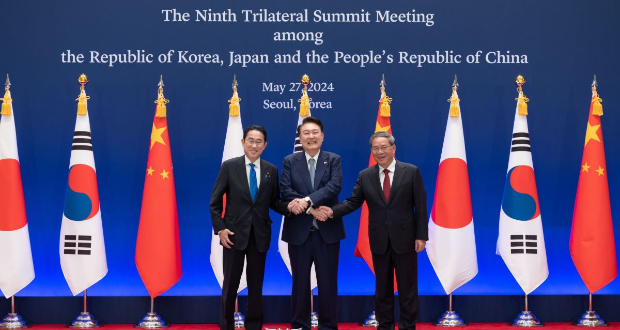The summit adopted a joint declaration, and was accompanied by bilateral meetings between Japan and China, Japan and South Korea, and China and South Korea.
What prompted the summit? There are several explanations. One is that China is trying to keep its neighbors in check, as Japan, the United States and South Korea strengthen their relations. Another reason is that each country wanted to bolster ties with its neighbors amid an uncertain international political environment ahead of the U.S. presidential election. Finally, it could be argued that with China returning to a policy of neighborhood diplomacy, the Japan-China-South Korea trilateral summit was on its list of measures.
In the wake of the summit, some observers in Japan claimed that it did not produce any results. This seems a somewhat overly pessimistic take. For one thing, at a time of numerous challenges, it is notable in itself the leaders of the three countries were able to sit down at a table for dialogue, and even issue a joint declaration. Especially at the bilateral meetings, each leader conveyed “what ought to be said.” This was likely done with domestic public opinion in mind, but the expressions of “what ought to be said” were relatively low key. Although Japan did protest to the Chinese over the issues of Fukushima’s ALPS treated water and the detention of Japanese nationals, the protests were fairly restrained. With such an uncertain global outlook, some credit should be given to the three countries for being able to affirm peace and stability within the region.
Moreover, there were some concrete outcomes, such as the agreement to go ahead with negotiations on the Japan-China-Republic of Korea Free Trade Agreement (Trilateral Free Trade Agreement). The Regional Comprehensive Economic Partnership (RCEP) has already entered into force, so Japan, China, and South Korea already have an FTA. However, RCEP includes ASEAN countries, so the degree of liberalization is quite limited. As such, it is significant that the aim is to conclude an FTA that goes further than RCEP manages to do. The issue of economic security, which makes it exceedingly difficult to liberalize the markets for high-spec, sensitive products, may ultimately make it difficult to conclude an FTA. Still, it is meaningful for the three countries to meet and exchange information with each other with an FTA as the ultimate goal. Each country will benefit from understanding what the other two value and what they are most sensitive about.




